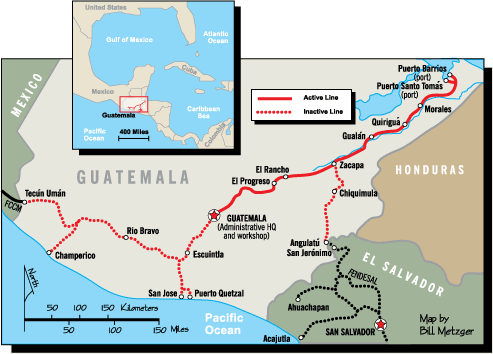
Ferrovías Guatemala
Freight
Exited | 1-Dec-2013
Fast Facts
322
200
39,604
6
130
Containers, steel, cement, paper, bananas
Background
In October 1997, a 50-year concession to restore and operate the Guatemalan rail system was awarded to RDC. The concession also included port facilities and the right to develop alternative uses for the right of way, such as pipelines and fiber optics.
Ferrovías Guatemala ("FVG"), formed by RDC and Guatemalan investors, was a 497-mile (narrow gauge) (800 km) railroad connecting Guatemala City with Mexico, El Salvador, and ports on both the Atlantic and Pacific coasts. After years of little maintenance, loss of traffic, invasion by squatters, the abandonment of operations in 1996, and the destruction caused by Hurricane Mitch in late 1998, commercial service was resumed on April 15, 1999 with a short-haul (60 km.) cement movement to El Chile. In December 1999 commercial service was restored to the Atlantic ports of Puerto Barrios and Puerto Santo Tomas. Subsequent phases of the rehabilitation project would involve restoration of service to Mexico and El Salvador.
After the successful revival and operation of the railway for seven years, the Government of Guatemala issued a Presidential decree in August 2006 which declared the rolling stock contract of FVG's concession "lesivo" or "harmful to the interests of the State". The decree was issued by the Government after RDC refused to give into the Government's extortionate demands to renegotiate and surrender its key economic rights under the concession contracts. The lesivo decree caused FVG's railway business to collapse due to the environment of commercial uncertainty and political maneuvering. Ultimately, RDC was forced to shut down FVG's operations. The last train ran in September 2007 and since then the railway has literally disappeared, with even steel bridges being stolen for scrap in broad daylight.
After five years of arbitration, on June 29, 2012, a Tribunal of the International Centre for Settlement of Investment Disputes (ICSID) unanimously ruled that Guatemala had violated the minimum standard of treatment set forth in Article 10.5 of CAFTA by engaging in conduct that was "arbitrary, grossly unfair, [and] unjust" towards RDC and awarded RDC full reparations. RDC's ICSID claim was the first to use the investor-state dispute resolution mechanism under Chapter 10 of CAFTA.
As of December 1, 2013, the majority shareholder of FVG is the Government of Guatemala after RDC received full payment of the award and surrendered its 82% interest.
RDC and FVG Chairman Henry Posner III comments, "The loss of the railway for a second time was a national tragedy, and it can truly be said that there were no winners in this case. But this now offers Guatemala the opportunity to once again look to the international railway investment community to develop the urban train, dry canal, Mexican rail link and other projects that the country aspires to. In this regard we pledge our full cooperation and support."

